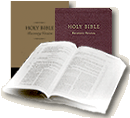| |
The Reformation
|
| |
Martin Luther
(1483-1546 A.D.) | | Recovered the truth of justification by faith and gave the world an open Bible. His early writings were written in the spirit of Brethren of the Common Life, showing that salvation is obtained by a direct access to God through faith in Christ and obedience to His Word. Adhered to the doctrines of the Scripture. Translated the Bible into German. |
Ulrich Zwingli
(1484-1531 A.D.) | | A leader of the reformation in Switzerland. Interpreted the New Testament book by book. Regarded the Scripture to be the only controlling principle. Wrote sixty-seven short essays explaining salvation is of faith. Denied the Catholic superstitions but remained unclear about the truth concerning baptism. |
Kaspar von Schwenckfeld
(1489-1561A.D) | | The central figure of the Reformation in Silesia. Believed in the inspiration of the whole Bible. Declared the truth that salvation is an organic process and that the crucified and glorified God-man is a life giving Spirit. Affirmed the universal priesthood of all believers. Regarded the matter of being chosen as something not by human will but by the thrust, revelation and manifestation of the Spirit. |
Jacques Le Fevre
(1455-1536 A.D.) | | A main figure in the movement of the Reformation in France and Switzerland at the beginning of the sixteenth century. Translated the New Testament and plasms into French. Took people to the Bible. Taught plainly: "It is God alone, Who by His grace, through faith, justifies unto everlasting life." |
Guillavme Farel
(1489-1565 A.D.) | | A leading figure in the movement of the Reformation in and Switzerland. Experienced salvation by faith in the Son of God and the sufficiency of His atoning work. Knew salvation comes not from works but from the grace of God. Ardently labored in the French Switzerland (especially in Geneva) and finally gain John Calvin. |
John Calvin
(1509-1564 A.D.) | | His The Institutes of the Christian Religion is a book in the Reformation which offers the soundest organizations and the clearest systematization on the Christian belief and life. Developed and expounded the truth that justification by faith and baptism represent the proof of God's promise. Emphasized the truths concerning God's glory, the predestination of the believers, the security of salvation, believers' efforts to seek the God as the goal of the call. Wrote notes on the Bible and ranked as the most voluminous author in the Reformation. Advocated the truth concerning elders' management of the church, which was followed by the Scottish reformers and became the origin of the Presbyterian Church. |
| Anabaptists | | Congregations of German brethren who were virtually Baptists. Preached the truth of justification by faith. Saw the error of infant baptism. Recovered the fellowship with the Lord in the spirit despite the frustrations of religious formalities and the world. Many hymns were written in imprisonment, expressing to the fullest extent the experience of suffering for the Lord and the love for Him. |
Menno Simon
(1492-1559 A.D.) | | One of the principal teachers among the Anabaptists. Diligently studied the Bible. Traveled extensively in Holland to visit prosecuted believers and raising up meetings. His followers became the Mennonites, who were the first group of believers to realize the error of a hierarchy. They recovered the way of addressing each other as brothers. Some of them went to Russia to preach the gospel. |
William Tyndale
(1494-1536 AD) | | Translated the Bible into English, which edition was widely circulated. Martyred. |
| The Puritans | | Raise up as a result of the Calvinistic influence. Exalted the Scripture as the fundamental authority. Repudiated the teaching of the Nicolaitans and idol worship. Determined to establish a church according to the scriptural way. Persecuted and took refuge in Holland. Founded the Congregational Church in 1616. Sailed on Mayflower to American in 1620 and laid a foundation which lasts till today. |
George Fox
(1624-1691 A.D.) | | The leader in the Quakers (Society of Friends). Pursued the real spiritual experience. Saw that believers can receive direct enlightenment from the Lord. Believed in the direct inspiration of the Holy Spirit. Conducted meetings mostly in the way of respecting the free operation of the Holy Spirit. |
John Bunyan
(1628-1688 A.D.) | | A puritan who was exceptionally gifted with giving sermons. His Pilgrim's Progress is probably more read than any book ever written except the Bible. Almost eighty percent of the dialogues in the book comes from direct quotations or adaptations from the Bible. Martyred. |
J. Spener
(1635-1705 A.D.) | | A principal figure of the pietists in the Reformed Church. Realized at his time the Lutheran domination had fallen into a kind of formal religion which was full of human opinions. Advocated a return to the teaching of First Corinthians 14. Taught people to reject the traditional formalities and to follow the leading of the Holy Spirit. |
Gottfried Arnold
(1666-1714 A.D.) | | A friend a Spener. Wrote books on questions of the church, considering that the church at that time had deviated from the truth and that it must return to the proper ground as revealed in the New Testament. Awakened the hope of separation from the world and communion with all saints. |
|
|
 | |
Christ
is the CenterThe Body
is the Line The New Jerusalem
Is the Goal
|
|
The Mystics |
| |
|
Sign-up here:
______________
|
|
|
|
|
|








 times.
times.